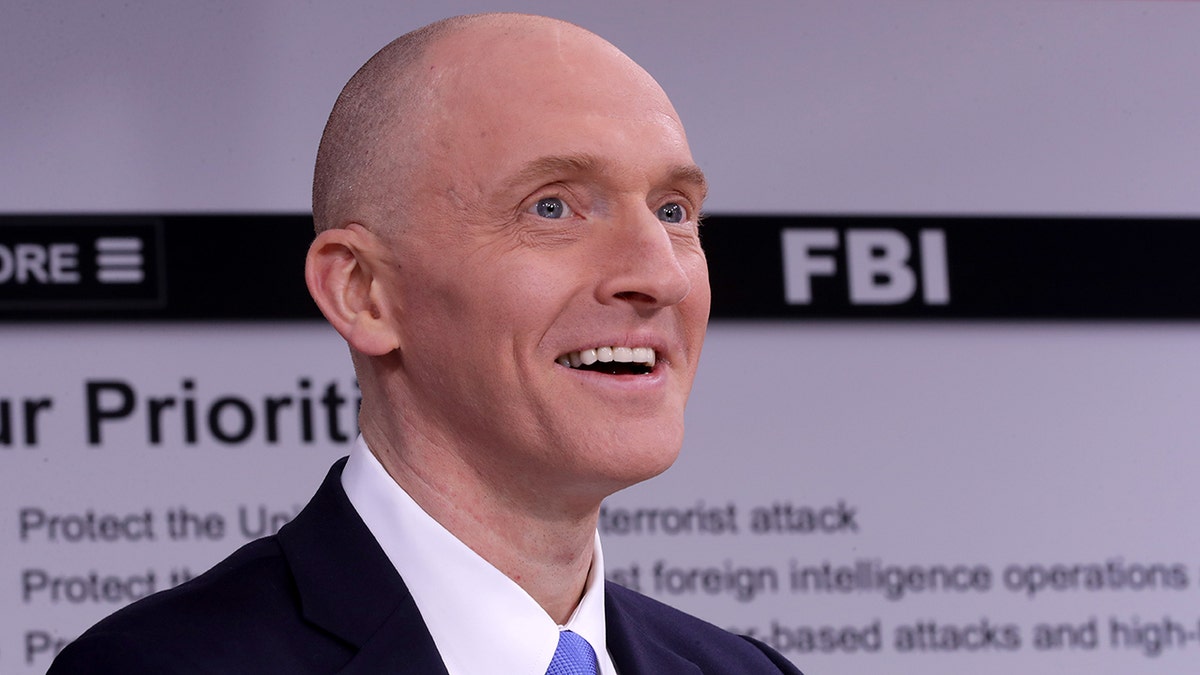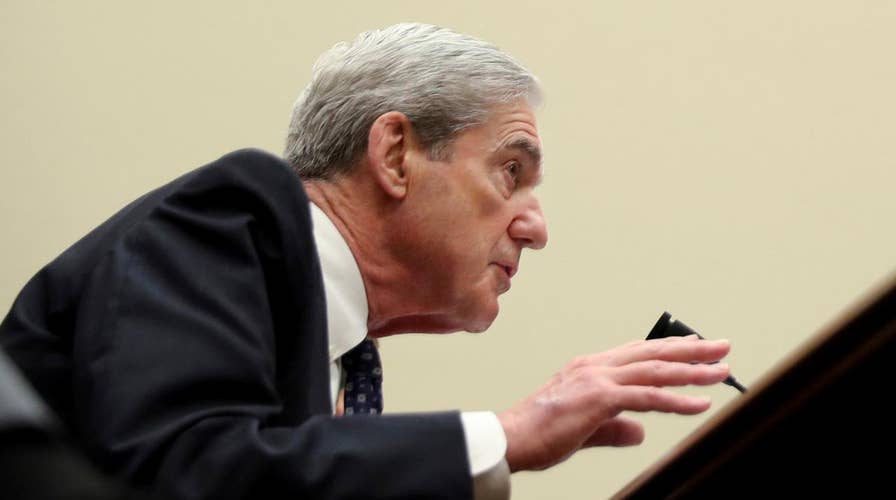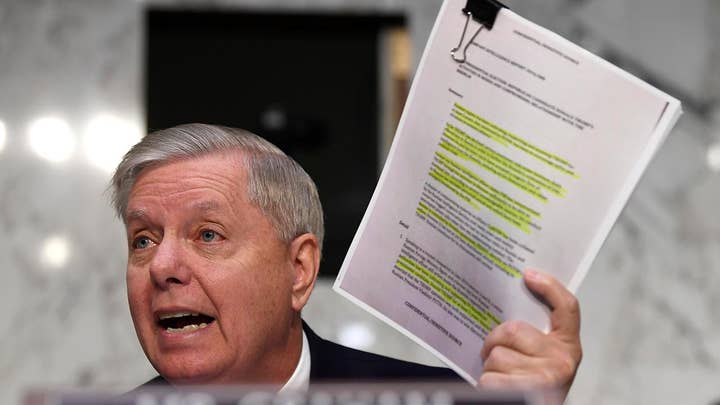Looking back at the progression of the Russia investigation
Bret Baier looks back at the Russia investigation and its impact on Trump's presidency.
Earlier this month, the secretive Foreign Intelligence Surveillance Court (FISC) ordered the FBI to re-verify all previous warrant applications involving the FBI attorney who falsified evidence against the former Trump campaign aide Carter Page. However, Fox News has learned the court did not order the FBI to double-check warrant applications involving other officials who made key omissions and errors in warrant applications as the bureau sought to surveil Page.
The FISC's failure to request a comprehensive evaluation of previous submissions has stunned court-watchers who have questioned whether enough is being done to deter future misconduct by the FBI. In the past, the FISC has gone so far as to prohibit some FBI agents from appearing before the court after finding impropriety.
In response to Justice Department Inspector General Michael Horowitz's recent report into FBI surveillance abuses, FBI Director Christopher Wray has claimed that the agency "embraces the need for thoughtful, meaningful remedial action." Congressional Republicans, however, remain unconvinced that the bureau will solve the problem on its own.
“The deceptive actions of a few high-ranking officials within the FBI and the Department of Justice have eroded public trust in our federal institutions,” Rep. Chris Stewart, R-Utah, stated last week as he introduced a bill to reform the FISC in response to the Horowitz report. “They flattened internal guardrails, deceived the FISA court, and irreparably damaged the reputation of an innocent American.”
Horowitz found specific evidence of oversights and errors by several top FBI employees as they sought to obtain a warrant to surveil Page under the Foreign Intelligence Surveillance Act (FISA). For example, an unidentified FBI supervisory special agent (SSA) mentioned in the IG report was responsible for ensuring that the bureau's "Woods Procedures" were followed in the Page warrant application.
According to the procedures, factual assertions need to be independently verified, and information contradicting those assertions must be presented to the court. But Horowitz found several instances in which the procedures were not followed.

Former Trump adviser Carter Page. (Photo by Chip Somodevilla/Getty Images)
Horowitz's report leaves little doubt that the unnamed SSA is Joe Pientka -- a current bureau employee.
The inspector general also noted than an unnamed "Case Agent 1," was "primarily responsible" for some of the "most significant" errors and omissions in the FISA warrant applications and renewals submitted to the FISC to extend the monitoring of Page.
Nevertheless, FISC Presiding Judge Rosemary Collyer ordered the FBI only to identify "all other matters currently or previously before this Court that involved the participation of the FBI OGC [Office of General Counsel] attorney" mentioned in Horowitz's report.
Additionally, Collyer ordered the FBI to "describe any steps taken or to be taken by the Department of Justice or FBI to verify that the United States’ submissions in those matters completely and fully described the material facts and circumstances" and to advise whether the attorney's conduct "has been referred to the appropriate bar association(s) for investigation or possible disciplinary action."
Those were apparent references to ex-FBI attorney Kevin Clinesmith, who Horowitz found to have doctored an email from the CIA. The FBI reached out to the CIA and other intelligence agencies for information on Page; the CIA responded in an email by telling the FBI that Page had contacts with Russians from 2008 to 2013, but that Page had reported them to the CIA and was serving as a CIA operational contact and informant on Russian business and intelligence interests.
Clinesmith then allegedly doctored the CIA's email about Page to make it seem as though the agency had said only that Page was not an active source. And, the FBI included Page's contacts with Russians in the warrant application as evidence he was a foreign "agent," without disclosing to the secret surveillance court that Page was voluntarily working with the CIA concerning those foreign contacts.
Collyer has separately sought updates from the FBI concerning details in the IG report but has ordered a re-review of any other FISA applications that were previously reviewed.
However, details in the IG report reveal that the pervasiveness of apparent misconduct in the FISA process extended far beyond Clinesmith.
The unnamed "SSA 1" in the IG report was given a supervisory role on the Russia investigation team, overseeing agents and reporting directly to since-fired anti-Trump FBI agent Peter Strzok. The special agent created the electronic sub-file to which the reports by ex-MI6 agent Christopher Steele would be uploaded. According to Horowitz, these reports were used to support the probable cause in the Page FISA applications.
Then, on Sept. 23, 2016, Yahoo News published an article describing U.S. government efforts to determine whether Page was in communication with Kremlin officials. The article seemed to closely track information from one of Steele’s reports. As a result, one FBI case agent who reported to SSA 1 believed Steele was the source, according to Horowitz.
FBI AGENTS MANIPULATED FLYNN FILE, AS CLAPPER URGED 'KILL SHOT,' EXPLOSIVE FILING CLAIMS
SSA 1 apparently thought the same, as his notes from a meeting held on Sept. 30, 2016, said: “Control issues -- reports acknowledged in Yahoo News.” When questioned by Horowitz's office, the agent explained he was concerned -- but not sure -- that Steele was the Yahoo News source.
The drafts of the Page FISA application, however, tell a different story. Horowitz found that until Oct. 14, 2016, drafts state that Steele was responsible for the leak that led to the Yahoo News article. One draft specifically states that Steele “was acting on his/her own volition and has since been admonished by the FBI.”
These assertions, which could have pointed to political motivations for Steele to make his information public weeks before the 2016 presidential election, were changed to the following: Steele’s “business associate or the law firm that hired the business associate likely provided this information to the press.”
Horowitz found no facts to support this assessment.
On Oct. 11, 2016, Steele met with then-State Department official Jonathan Winer and Deputy Assistant Secretary Kathleen Kavalec. Steele informed Kavalec that the overseers of a Russian cyber-hacking operation targeting the 2016 U.S. elections were paying the culprits from “the Russian Consulate in Miami.” Kavalec later met with an FBI liaison and explained to them that Russia did not have a consulate in Miami. SSA 1 was informed of Steele’s incorrect claim on Nov. 18, 2016, but the FISA court was never provided this information, according to the IG report.
Additionally, SSA 1 was aware of Page’s denials to an FBI confidential human source (CHS) that he knew Russian officials Igor Sechin and Igor Divyekin – officials that Steele alleged Page had met in Moscow in July 2016. In fact, Horowitz found that SSA 1 “knew as of October 17 that Page denied ever knowing Divyekin."
"This inconsistency was also not noted during the Woods Procedures on the subsequent FISA renewal applications, and none of the three later FISA renewal applications included Page’s denials to the CHS," Horowitz wrote, referring to the FBI's practice of reverifying facts in its FISA application before seeking renewals.
7 TAKEAWAYS FROM HOROWITZ'S BOMBSHELL FISA REPORT
SSA 1 also was responsible for “confirming that the Woods File was complete and for double-checking the factual accuracy review to confirm that the file contained appropriate documentation for each of the factual assertions in the FISA application," according to Horowitz.
But Horowitz found numerous instances “in which factual assertions relied upon in the first FISA application targeting Carter Page were inaccurate, incomplete or unsupported by appropriate documentation, based upon information the FBI had in its possession at the time the application was filed."
In particular, the FBI misled the FISC by asserting that Steele’s prior reporting "has been corroborated and used in criminal proceedings.” Horowitz's review found there was no documentation to support this statement; SSA 1 told Horowitz they “speculated.”
SSA 1 was also aware, according to Horowitz, that Steele had relayed his information to officials at the State Department, and he had documentation showing Steele had told the team he provided the reports to his contacts at the State Department. Despite this, the FISC was informed that Steele told the FBI he “only provided this information to the business associate and the FBI.”
CLICK HERE TO GET THE FOX NEWS APP
Republican calls for more accountability may not go unanswered for long. Connecticut U.S. Attorney John Durham announced this month that he did not "agree" with the IG's assessment that the FBI's probes were properly predicted, highlighting Durham's broader criminal mandate and scope of review.
Durham is focusing on foreign actors as well as the CIA, while Horowitz concentrated his attention on the Justice Department and FBI.
"Based on the evidence collected to date, and while our investigation is ongoing, last month we advised the Inspector General that we do not agree with some of the report’s conclusions as to predication and how the FBI case was opened," Durham said in his statement, adding that his "investigation is not limited to developing information from within component parts of the Justice Department" and "has included developing information from other persons and entities, both in the U.S. and outside of the U.S."
Wilson Miller contributed to this report.














































